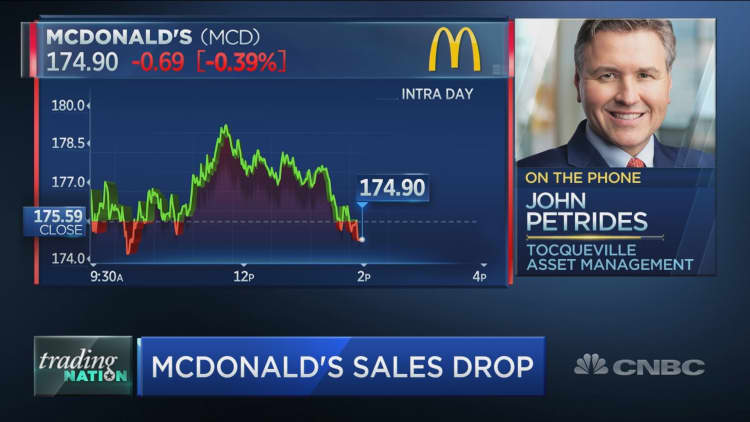The coronavirus pandemic is straining McDonald's relationship with its U.S. franchisees once again.
The fast-food giant is pushing for franchisees to do more to protect their workers, while franchisees are asking for more financial relief to keep them afloat. Franchisees operate 95% of McDonald's 14,000 U.S. restaurants.
McDonald's is deferring rent for three months for franchisees to lessen the financial blow of social distancing measures. Only about one-third of its U.S. franchisees will be asked to pay March rent. Operators who have seen the sharpest sales drops are also receiving deferrals on service fees.
Tensions between the National Owners Association and McDonald's management have flared up in the past month, based on correspondence between the two viewed by CNBC. McDonald's U.S. franchisees formed the independent advocacy group in 2018 to push back against the Chicago-based company's discounts and renovation plans. The NOA now represents more than 70% of McDonald's U.S. operators.
The National Franchisee Leadership Alliance, which officially negotiates with McDonald's on behalf of franchisees, asked for a two-week extension on service fees and rent due April 10, citing the uncertainty surrounding the Small Business Administration emergency loans. McDonald's operators make a base rent payment on the first of the month and then pay rent and fees on the tenth, based on the prior month's revenue for the location.
McDonald's management denied the request on April 3.
The NOA told McDonald's management in a letter dated April 7 that its members and most of the company's franchisees are "increasingly losing faith in the partnership and company leadership."
"Too much time has passed since the crisis has started, too many opportunities to make a statement of support are diminished and frankly as company leaders make hollow or superficial claims dozens of other companies are acting much more compassionately than the industry leader," the NOA wrote.
The group mentioned that other fast-food executives are foregoing their salaries.
The following day, CEO Chris Kempczinski said that he and four other executives would be taking pay cuts after discussing the move for several weeks with the company's board, which endorsed the decision.
McDonald's U.S. President Joe Erlinger responded April 9 that their faith in management seemed to be based on unlimited financial support.
"If that's how the NOA seeks to define its relationship with McDonald's, then in reality, we don't have a relationship, and I am extremely disappointed and disheartened by this," Erlinger wrote in a letter obtained by CNBC.
Erlinger estimated that McDonald's has given operators about $900 million of additional liquidity and said that no other major franchisor has done more to support its franchisees.
"It's important to emphasize that our financial support is intended to help owner/operators survive this crisis. McDonald's is not able to guarantee owner/operator cash flows or equity values," Erlinger wrote.
In March, McDonald's said it would give employees of company-owned locations paid leave for two weeks if they were exposed to the coronavirus. But the company has continued to face criticism from politicians and its own workers.
Erlinger asked the NOA and the NFLA to endorse a similar policy and support a 10% raise for its employees who are working for the next 60 days, citing the potential positive impact on the company's reputation.
McDonald's U.S. same-store sales fell 13% in March as the company transitioned to serving its Big Macs and McFlurries through takeout, drive-thru and delivery only. The fast-food chain has suffered smaller declines than the broader restaurant industry, likely due to its lower prices and drive-thru lanes.
Shares of the company, which has a market value of $137 billion, have fallen more than 9% so far this year. The stock was down more than 3% in midday trading Wednesday.



